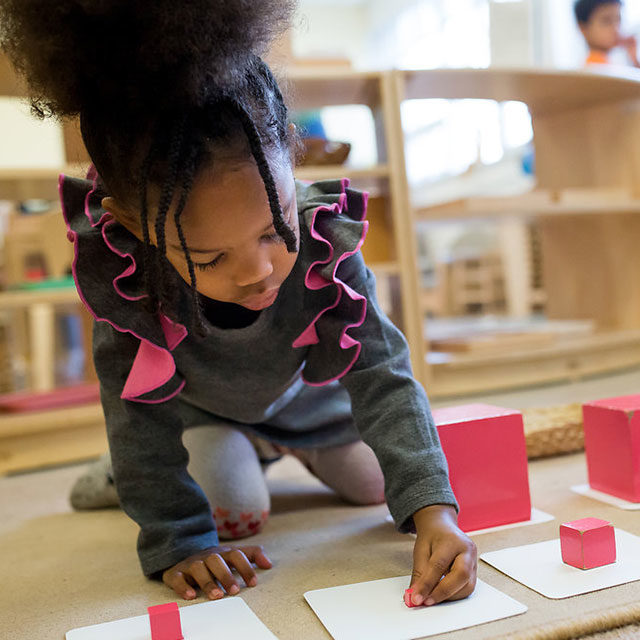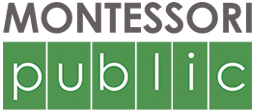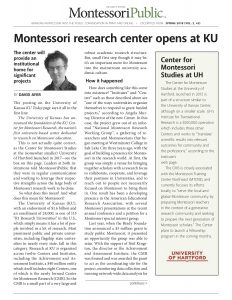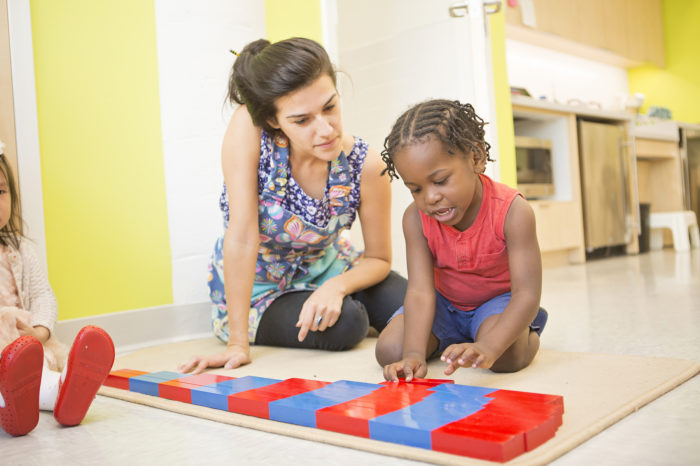Montessori Research Center Opens at KU

This article appears in the
Spring 2018 print issue
of MontessoriPublic.
The posting on the University of Kansas KU Today page says it all in the first line:
The University of Kansas has announced the foundation of the KU Center for Montessori Research, the nation’s first university-based center dedicated to research on Montessori education.
This is not actually quite correct, as the Center for Montessori Studies at the (somewhat smaller) University of Hartford launched in 2017. Leaders at both institutions told MontessoriPublic that they were in regular communication and working to leverage their respective strengths across the large body of Montessori research work to be done.
So what does this mean? And what does this mean for Montessori?
The University of Kansas (KU), with an endowment of $1.6 billion and an enrollment of 24,000, is one of 115 “R1 Research Universities” in the U.S., which simply means it has a lot of people involved in a lot of research. Most prominent public and private universities, including flagship state universities in nearly every state, fall in this category. Research at KU is organized across twelve Centers and Institutes, including the Achievement and Assessment Institute, a $40 million entity which itself includes eight Centers, one of which is the newly formed Center for Montessori Research (CMR). So the CMR is a small part of a very large and robust academic research structure. But, small first step though it may be, it’s an important move for Montessori into the mainstream university academic culture.
How it happened
How does something like this come into existence? “Institutes” and “Centers” such as those described above are “one of the ways universities organize themselves to respond to grant funded projects,” according to Angela Murray, Director of the new Center. In this case, the project grew out of an informal “National Montessori Research Working Group”, a gathering of researchers and Montessorians that began meeting at Westminster College in Salt Lake City three years ago, with the goal of building a presence for Montessori in the research world. At first, the group was simply a venue for bringing to gather scholars with a research focus to collaborate, cooperate, and leverage their positions in Universities, and to reach out to people not necessarily focused on Montessori to bring them in. One result has been a developing presence in the American Educational Research Association, with several Montessori presentations at the recent annual conference and a petition for a Montessori special interest group.
Last year, when the Brady Foundation announced a $3 million grant to study public Montessori, it presented an opportunity the group was able to seize. With the support of Neil Kingston, the director or the Achievement and Assessment Institute, the CMR was formed and was awarded the grant to act as the coordinating site for the project, monitoring data collection and running network-wide data analysis for five study sites over a five year period. (The Center was in the works already and will not rely solely on this funding, but the grant has served as an organizing principle.)
Montessori fidelity
Another project the CMR is beginning work on is a “fidelity instrument” for assessing the authenticity of a Montessori program for research purposes. This has been a persistent challenge for Montessori research: since the name is not copyrighted or trademarked and anyone can use it, how can researchers be sure that what they are studying represents “real Montessori”, or that the results will be applicable in other programs? Researchers have typically relied on AMI or AMS recognition or accreditation (which, while sharing some criteria, are neither fully consistent with each other nor widely prevalent, especially in public schools) or have developed their own models (as was done in the Furman Institute study in South Carolina). The latter can be resource-intensive for small studies, and a broadly accepted and validated standard would greatly extend the scope of possible research. Several templates across various organizations (AMI, AMS, NCMPS, MPPI, Montessori Australia, etc.) exist, and are in broad agreement about criteria, but they have not yet been brought into concordance in a way that makes assessment easy. The new era of collaboration and cooperation among Montessori organizations is now making this work possible.
Montessori and the academy
In her time, Maria Montessori was creating a radical reshaping of the education paradigm and, for a complex set of reasons, chose not to pursue her work within the academic context. This made sense at the time, but the academy has become much more open and receptive to Montessori as the movement has grown in reach and internal coordination. Centers such as the CMR at KU and the CMS at Hartford, the large-scale Furman study in South Carolina, Angeline Lillard’s work in Hartford, and the Brady Foundation funding are indications that Montessori can find its way in the academic research world, and that academia is beginning to take notice.
David worked in private Montessori for more than twenty years as a parent, three-to-six year-old and adolescent teacher, administrator, writer, speaker, and advocate. In 2016 he began working with the National Center for Montessori in the Public Sector. David lives in Portland, Oregon.







